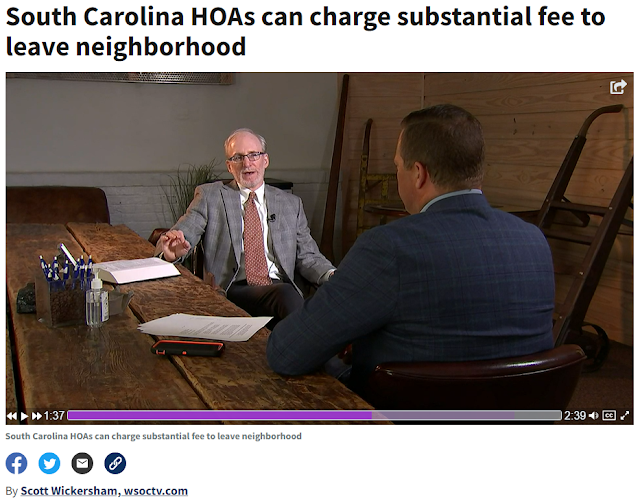We were pleased to be featured on today's WSOC-TV news in an investigation by reporter Scott Wickersham about HOA transfer fees. You can watch the report here: South Charlotte HOA charges substantial fee to leave neighborhood
We could write pages about the topic, but suffice it to say that for any North Carolina HOA or condominium created on or after July 1, 2010, transfer fees, meaning any fee paid to the HOA or anyone else, are prohibited except for from the first purchaser from the developer.
While HOAs or condominiums created prior to that date are excluded from this prohibition, any HOAs considering enforcing a transfer fee by lien or other legal action should take great care and consult with their attorneys first.
Fees paid to the HOA or the HOA's management company for closing certifications or payoff letters are NOT considered transfer fees as long as they do not exceed $200 (plus an additional $100 rush fee if needed within 48 hours.)
In South Carolina, transfer fees are NOT regulated and are purely a matter of your HOA's recorded restrictions. You have read those, right?
As always, you need to get involved in your HOA and be aware of not only where its money is going, but also where it is coming from - it could be from you when you go to sell your home. All associations are required to have an annual meeting, and in North Carolina, additionally are required to have an annual budget meeting where the budget for the upcoming year is reviewed with the members.
Avail yourself of these opportunities to be aware of where the association’s funds come from and where they go! Get involved in the budget process so you are not surprised when charges may become due at closing.
At closing, buyers and sellers can only be made to pay what they have legally agreed to pay as between the two of them. The closing attorney works for them. Subject to the terms and conditions of the purchase agreement between the parties, the closing attorney should not put anything on the final closing statement which is objected to by either party.
Folks buying or selling homes need to review the closing disclosures carefully and as far ahead of time as possible! Be prepared to delay closing if necessary until your concerns regarding what you are being charged at closing are satisfied. This means not having movers scheduled at the home for the same day that closing is scheduled, for example. Sellers in particular have little bargaining power at the closing table, and even more so if there are movers moving their furniture out the front door at the same time they are reviewing the closing documents for the first time.
We represent HOAs and condominium associations throughout North Carolina. We DO NOT represent homeowners in disputes with their HOAs. Please contact us if we can be of service to your HOA.


